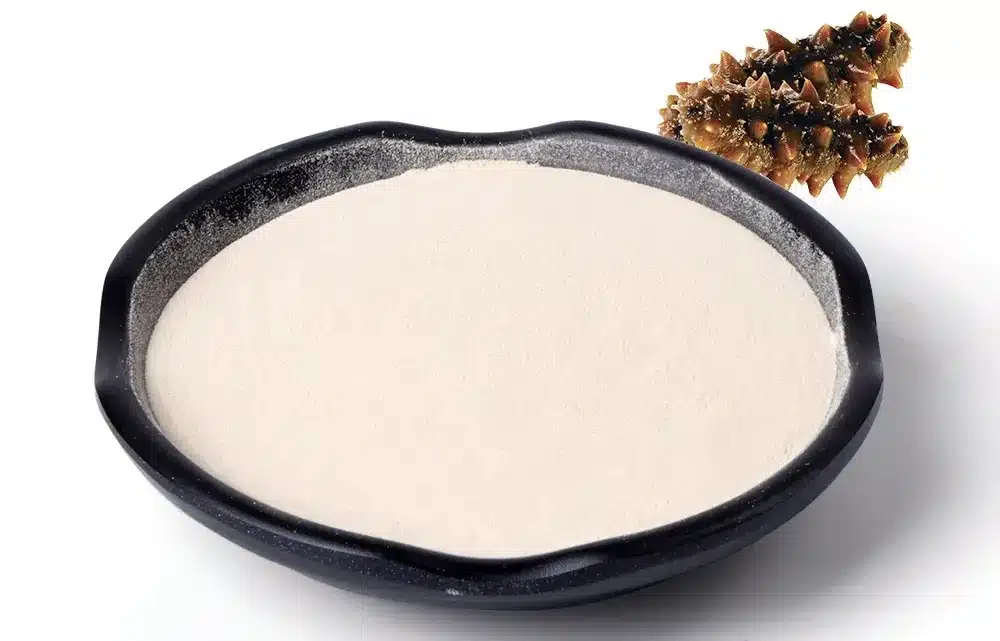1. Introduction
The natural supplement market has expanded in recent years, offering various products derived from diverse sources. Gelatin and sea cucumber peptide have emerged as notable contenders due to their purported health benefits. Both substances are derived from natural sources and are celebrated for their unique properties, but they cater to different health needs. This article explores the characteristics, benefits, and applications of gelatin and sea cucumber peptide, providing a thorough comparison to guide informed decisions about their use.
2. Understanding Gelatin
Gelatin is a protein obtained by the partial hydrolysis of collagen, a structural protein found in the connective tissues of animals. This process involves boiling animal bones, skin, and tendons to extract collagen, which is then processed into Gelatin.
2.1. Nutritional Profile
Gelatin primarily comprises amino acids, including glycine, proline, and hydroxyproline. These amino acids are crucial for the maintenance and repair of connective tissues. Despite its rich amino acid content, Gelatin is an incomplete protein because it lacks tryptophan, one of the essential amino acids.
2.2. Health Benefits
- Joint Health: Gelatin is widely recognized for its potential benefits to joint health. Studies have shown that gelatin supplementation can help reduce joint pain and improve mobility, particularly in individuals with osteoarthritis.
- Skin Health: Collagen is a significant component of skin structure. Gelatin consumption may support skin elasticity and hydration, potentially reducing the appearance of wrinkles and improving skin texture.
- Digestive Health: Gelatin supports digestive health by strengthening the gut lining and enhancing gut function. It may aid in conditions like leaky gut syndrome.
2.3. Applications
Gelatin is used extensively in the food industry as a gelling agent in products such as jellies, marshmallows, and gummy candies. It also finds applications in pharmaceuticals, where it is used as a binder in capsules and cosmetics for its skin-enhancing properties.
3. Sea Cucumber Peptide: An Overview
Sea cucumber peptide is derived from sea cucumbers, marine animals known for their rich nutritional content. Through enzymatic hydrolysis, the proteins in sea cucumbers are broken down into smaller peptides that are easier for the body to absorb.
3.1. Nutritional Profile
Sea cucumber peptide is a rich source of bioactive compounds, including essential amino acids and minerals such as calcium, magnesium, and zinc. It contains a comprehensive range of amino acids, making it a complete protein source. Additionally, sea cucumber peptide is known for its high mucopolysaccharide content, which has various health benefits.
3.2. Health Benefits
- Anti-Inflammatory Properties: Sea cucumber peptides have anti-inflammatory effects, which may help reduce inflammation and associated symptoms in conditions like arthritis.
- Immune Support: Sea cucumber peptide is believed to enhance immune function, partly due to its content of bioactive compounds that support the body’s defense mechanisms.
- Skin Health: Similar to Gelatin, sea cucumber peptide improves skin health. Its components may support skin elasticity, hydration, and wound healing.
- Joint Health: The peptides derived from sea cucumbers may also benefit joint health by reducing inflammation and improving joint function.
3.3. Applications
Sea cucumber peptide is primarily used in dietary supplements to support immune health, reduce inflammation, and promote skin and joint health. It is less commonly found in food products than Gelatin but is gaining popularity in the supplement market.
4. Comparative Analysis
4.1. Source and Composition
- Gelatin: Extracted from animal connective tissues, primarily bovine or porcine. It is an incomplete protein and lacks tryptophan.
- Sea Cucumber Peptide: Derived from marine animals, specifically sea cucumbers. It is a complete protein and contains a full range of essential amino acids, additional minerals, and mucopolysaccharides.
4.2. Health Benefits
- Gelatin: Best known for its benefits to joint and skin health, with additional support for digestive function.
- Sea Cucumber Peptide: Offers a broader range of benefits, including anti-inflammatory properties, immune support, and joint health, in addition to skin benefits.
4.3. Digestibility and Absorption
- Gelatin: Hydrolyzed into smaller peptides, making it easily digestible and absorbed by the body. However, its incomplete protein status means it should be complemented with other protein sources.
- Sea Cucumber Peptide: Also hydrolyzed into smaller peptides, ensuring high bioavailability and efficient absorption. It provides a complete protein source with additional bioactive compounds.
4.4. Safety and Allergies
- Gelatin: Generally considered safe, though individuals with allergies to its animal sources (bovine or porcine) should be cautious.
- Sea Cucumber Peptide: Safe for most people, but individuals with shellfish allergies should be aware, as sea cucumbers are marine animals and may trigger allergic reactions in sensitive individuals.
5. Conclusion
Both gelatin and sea cucumber peptides offer distinct advantages and cater to different health needs. Gelatin is well-established for supporting joint, skin, and digestive health. In contrast, sea cucumber peptide provides a broader spectrum of benefits, including anti-inflammatory and immune-supportive properties, and contributes to skin and joint health.
When choosing between gelatin and sea cucumber peptide, individuals should consider their specific health goals, dietary restrictions, and potential allergies. Both supplements offer valuable health benefits, and their selection should align with personal health objectives and preferences.
In conclusion, understanding the unique properties and benefits of gelatin and sea cucumber peptide can help individuals make informed decisions about their supplement choices. Consulting with healthcare professionals before starting new dietary supplements is always recommended to ensure they align with individual health needs and conditions.




